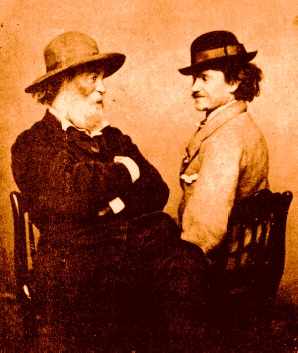




Calamaus A Series of Letters
Some books are true talismans. Their slumbering potent magic awaiting only the incantations of wizards to awake. Like an emerald reflecting pale moon light, the following book bespeaks of a bittersweet love still calling forth, eternal in its message of truth and longing, a voice that will not be stilled by death alone.
"I have Walt's (Whitman) raglan here (he goes to the closet and puts it on). I now and then put in on, lay down, think I am in the old times. Then he is with me again. It's the only thing I kept amongst many old things. When I get it on and stretched out on the old sofa I am very well contented. It is like an Aladdin's lamp. I do not ever for a minute lose the old man. He is always near by. When I am in trouble I ask myself What would Walt have done under these circumstances and what I decide Walt would have done that I do.
I was his proper nurse he understood me I understood him. We loved each other deeply. I should have gone to see him in spite of everything. I know it now. I did not know it then, but it is all right. Walt realized I never swerved from him he knows it now that is enough."
From the interview with Peter Doyle in the book Calamus A Series of Letters Written During the Years 1868-1880 by Walt Whitman to a Young Friend (Peter Doyle).
Spurned by Whitman's family, his character smeared and reviled by men of letters, Peter Doyle remained to the end Walt Whitman's most faithful friend and lover. To a large degree, Calamus is Doyle's funeral eulogy to Whitman. Barely literate, Doyle could not offer overwrought praise sated with classical illusions. He honored his friend and lover in the best way he knew how. His honest gift was to give to the world the words Whitman had given to him, the letters to him from Whitman that Doyle had saved for all those years. Letters superficially mundane in their observations, chatting about the weather, asking after old friends, complaining of aches and pains. But like a scarlet thread woven throughout is the constant care, the affection of Whitman for Doyle in matters large and small. It was the voice of a simple and abiding love. The song of two souls as one.
Calamus was also Doyle's incontestable statement of self worth. John Addington Symonds could call Doyle "an artless and uncultured workman", but Symonds and other men of letters, so admiring of Whitman, could never and would never find a place in Whitman's heart. Doyle did and, to the end of his days, Whitman's love was his guiding light.
The inscription in this copy of Calamus by Doyle to one of his friends hints at how proud Doyle was of this work. Even though they were not his words, this was his memoriam, his final goodbye. When Doyle signed his name, the pen skipped slightly and sprayed ink faintly against the beginning of his name, like a small constellation of black stars against a white sky.
Sitting alone at night with this book in my hands, one that belonged to Doyle himself, I glimpsed a truth that went beyond mere formal knowledge. That perhaps the world we know is but a shadow, beyond which lies a kingdom suffused with nameless love and mysteries.
Whitman, Walt. Calamus A Series of Letters Written During the Years 1868-1880 by Walt Whitman to a Young Friend (Peter Doyle). Boston, Laurens Maynard, 1897. First edition, first state. Fine in the original green cloth covered boards. Edited with an introduction by Richard Maurice Bucke. BAL number 21446, Issue A. Inscribed by Pete Doyle to Patrick Dougherty.
$25,000






